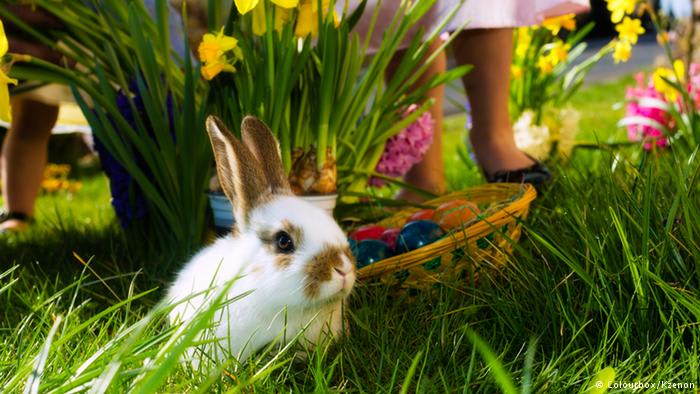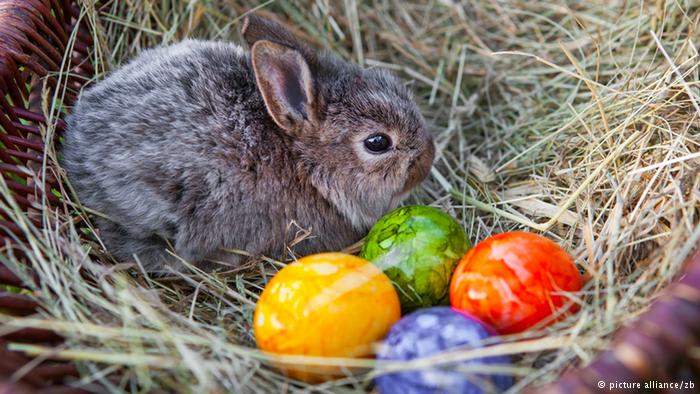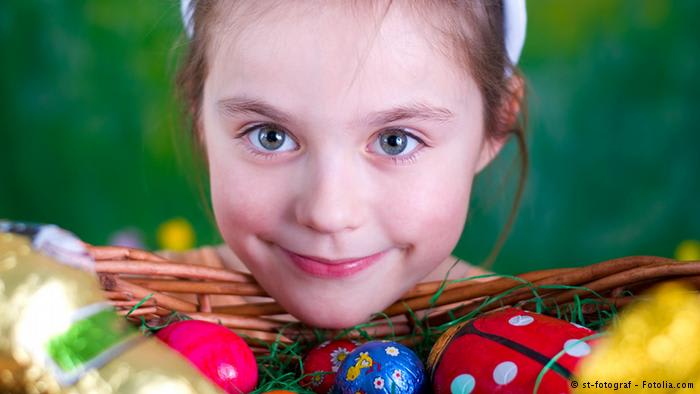2016年3月25日(Fri.) EU各地から、イースター休暇を伝えています。 日本ではそれほどなじみではありませんが、EU各国でこれをお祝いしています。クリスマス同様のようにも伝わってきます。(ニュースソース: DW-DE, THE LOCAL DK )
<原文の一部>
How to celebrate Easter in Germany
Watch out for sugar-coated lambs, fire and lots and lots of chocolate. Here's what to expect during the four-day Easter holiday in Germany.

*
Why Easter always falls on a different day
According to the Bible, Jesus was crucified around the time of the Jewish Passover, which was observed at the first full moon following the vernal equinox. Based on the Gregorian calendar, Easter is celebrated on the first Sunday following Passover: that is, depending on lunar cycles, between March 22 and April 25. German pupils look forward to two weeks of vacation surrounding the Easter holiday.
*
Easter surprises
The gift of calories is still the most popular Easter present in Germany, according to a 2015 Statista survey: 62 percent give sweets on Easter, while 38 percent give eggs. However, nearly half (45 percent) said they purchase small items like games, books or stuffed animals for their loved ones, especially kids. But not everyone participates in Easter commerce: 22 percent don't give gifts.
*
Extinguishing winter
According to an early Saxon tradition, fires are lit in Germany and elsewhere in northern Europe on Easter Saturday or Sunday. In the pre-Christian spring ritual, the fire was likely meant to expel winter. In rural northern Germany, Easter bonfires are lit by official brigades or on private premises and can turn into small festivals. The fire generally burns throughout the night.
*
Everyone knows that the Easter Bunny doesn't lay eggs, but that doesn't stop him from hiding them for children in countries all over the world - including Germany.
A symbol of fertility, spring and new life, eggs have become an integral part of Easter celebrations. In Germany, however, passion for eggs extends well beyond the holiday.







*
日本語では「復活祭」と訳されています。キリストの復活を祝うものとされており、春分後の満月の後の最初の日曜日が Easter Sunday とされているため、毎年この日は移動することになります。そして、今年は明後日の3月27日になっています。
また、直前の木曜日は Maundy Thursday :聖木曜日・洗足木曜日、翌日は Good Friday 、土曜日は通常の休日、Easter Sunday 、Easter Monday と続き、この土曜日を除く4日間を特別な日として扱っているようです。
さらに、ウサギ、卵、シュガーコーティングした子羊、チョコレートなどが、これを祝う定番の品々のようです。
*
<以下は、デンマークからの情報の一部>
The complete guide to Easter in Denmark
Easter is big in Denmark. It kicks off the summer season after a long, dull Nordic winter, and the Danes go all in for hygge - a warm, cozy environment with good times and good people.
When: Thursday to Monday
Denmark is a Christian country (at least on paper) and Easter celebrations therefore include Maundy Thursday, Good Friday, Easter Sunday and Easter Monday. These are national holidays in Denmark. Schools are closed and most people do not work.
*
加えて、デンマークからも伝えていますが、長い退屈な冬から抜け出して春を迎えるタイミングにもなっているようです。
***
宗教的な意味合いが濃厚なお祝いかと思いますが、これも文化の一つです。こうしたことに対する知識や理解も、異文化を知る上で大切なことの一つではないでしょうか。
*
一方、テロに襲われたベルギーなどでは、どのように今日を過ごしているのでしょうか。祈りを捧げるとともに、屈しない気持ちを強くされていることでしょう。
また、百年前の1916年4月24日 Easter Monday 、アイルランドでの復活祭蜂起、処刑されてしまったパトリック・ピアス達は、どんな想いでその日を過ごしたのでしょうか。
様々な想いが去来します・・・。
***
<原文の一部>
How to celebrate Easter in Germany
Watch out for sugar-coated lambs, fire and lots and lots of chocolate. Here's what to expect during the four-day Easter holiday in Germany.

*
Why Easter always falls on a different day
According to the Bible, Jesus was crucified around the time of the Jewish Passover, which was observed at the first full moon following the vernal equinox. Based on the Gregorian calendar, Easter is celebrated on the first Sunday following Passover: that is, depending on lunar cycles, between March 22 and April 25. German pupils look forward to two weeks of vacation surrounding the Easter holiday.
*
Easter surprises
The gift of calories is still the most popular Easter present in Germany, according to a 2015 Statista survey: 62 percent give sweets on Easter, while 38 percent give eggs. However, nearly half (45 percent) said they purchase small items like games, books or stuffed animals for their loved ones, especially kids. But not everyone participates in Easter commerce: 22 percent don't give gifts.
*
Extinguishing winter
According to an early Saxon tradition, fires are lit in Germany and elsewhere in northern Europe on Easter Saturday or Sunday. In the pre-Christian spring ritual, the fire was likely meant to expel winter. In rural northern Germany, Easter bonfires are lit by official brigades or on private premises and can turn into small festivals. The fire generally burns throughout the night.
*
Everyone knows that the Easter Bunny doesn't lay eggs, but that doesn't stop him from hiding them for children in countries all over the world - including Germany.
A symbol of fertility, spring and new life, eggs have become an integral part of Easter celebrations. In Germany, however, passion for eggs extends well beyond the holiday.







*
日本語では「復活祭」と訳されています。キリストの復活を祝うものとされており、春分後の満月の後の最初の日曜日が Easter Sunday とされているため、毎年この日は移動することになります。そして、今年は明後日の3月27日になっています。
また、直前の木曜日は Maundy Thursday :聖木曜日・洗足木曜日、翌日は Good Friday 、土曜日は通常の休日、Easter Sunday 、Easter Monday と続き、この土曜日を除く4日間を特別な日として扱っているようです。
さらに、ウサギ、卵、シュガーコーティングした子羊、チョコレートなどが、これを祝う定番の品々のようです。
*
<以下は、デンマークからの情報の一部>
The complete guide to Easter in Denmark
Easter is big in Denmark. It kicks off the summer season after a long, dull Nordic winter, and the Danes go all in for hygge - a warm, cozy environment with good times and good people.
When: Thursday to Monday
Denmark is a Christian country (at least on paper) and Easter celebrations therefore include Maundy Thursday, Good Friday, Easter Sunday and Easter Monday. These are national holidays in Denmark. Schools are closed and most people do not work.
*
加えて、デンマークからも伝えていますが、長い退屈な冬から抜け出して春を迎えるタイミングにもなっているようです。
***
宗教的な意味合いが濃厚なお祝いかと思いますが、これも文化の一つです。こうしたことに対する知識や理解も、異文化を知る上で大切なことの一つではないでしょうか。
*
一方、テロに襲われたベルギーなどでは、どのように今日を過ごしているのでしょうか。祈りを捧げるとともに、屈しない気持ちを強くされていることでしょう。
また、百年前の1916年4月24日 Easter Monday 、アイルランドでの復活祭蜂起、処刑されてしまったパトリック・ピアス達は、どんな想いでその日を過ごしたのでしょうか。
様々な想いが去来します・・・。
***









